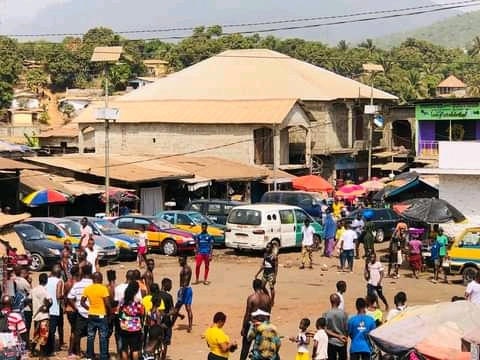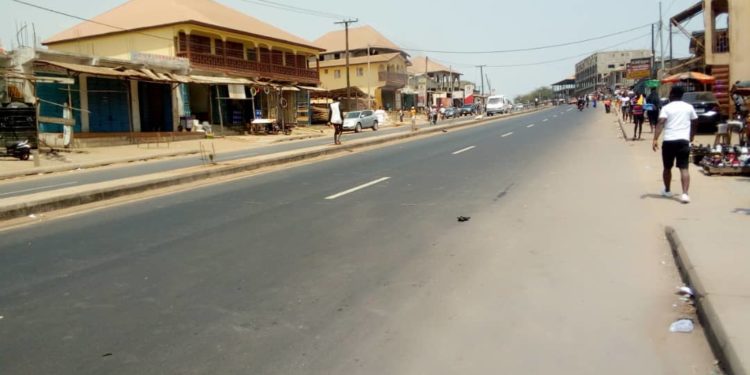By Kemo Cham, Ousman Bah & Melvin Tejan Mansaray
The Sierra Leonean capital, Freetown was brought to a standstill on Monday due to a strike action by commercial transport workers angry over persistent scarcity of fuel.
The strikers said they were also protesting hoarding of fuel by gas stations as well as a suspected plan by the government to increase pump prices further.
Scores of commuters were stranded on highways from Waterloo in the Western Area Rural to Freetown due to unavailability of commercial transport vehicles.
In some parts of Freetown, a group of men set up roadblocks, in an attempt to stop commercial vehicles carrying passengers.
The drivers’ union distanced itself from the strike, saying it didn’t sanction it, although an official said they understood the concerns of their members supporting it.
The Motor Drivers and General Transport Workers Union (MDGTWU) described them as “unscrupulous elements.”
Rumors about the strike action had emerged at least a day before. A memo purportedly from the leadership of the Sierra Leone Police warning of an imminent strike by drivers was circulated on social media, urging local commanders to be on the alert.
The MDGTWU in its statement on Sunday called on drivers not to heed the call to strike. The statement signed by its National Deputy Secretary General, Komboh Alusine Koroma, said while it understood the concern of its members, it also recognized that the fuel scarcity was caused by a global phenomenon.
“The Motor Drivers and General Transport Workers Union totally condemns the strike action since it has no substance or locus,” it said, adding: “The Union being a reputable and credible organization knows the due process before going into industrial action.”
The strike comes after days of uncertainties created by rumors of a potential increase in pump prices. It also follows increment of the prices twice in one month.

Both the government and importers of petroleum products blame the situation on the Russia-Ukraine crisis, which has caused shortage of fuel in the global market.
At Le15, 000 per liter for petrol and diesel, Sierra Leone currently has one of the highest pump prices in West Africa.
The aggrieved motorists say not only is the high cost a major concern, they are also worried by reports that the government intends to further increase it.
Mohamed Bangura, a commercial motor driver in Waterloo, said they wanted to send a message to the government to listen to their plight already worsened by the recent increment.
“We heard that the government intends to increase the price to Le20, 000. That’s why we embark on this strike,” says Bangura, speaking at the Tombo Park in Waterloo, where he and some of his colleague drivers spent part of the day playing football.
“The message is that …we have no other means of livelihood other than this. We hope the people will bear with us for just this one day of strike to send this message,” he says.
Drivers’ Union President Alpha Amadu Bah condemned the action of their members but said they shared their concerns.
Mr Bah told ManoReporters that even though the fuel crisis was a global problem, the impact in Sierra Leone has been orchestrated by unscrupulous gas station attendants who hoard the commodity and sell it in the black market where it fetches high price.
“The fuel stations have been increasing their prices. Some give it to boys to sell in the black market. That is what has caused this problem. That is our concern,” Mr Bah said in a telephone interview.
Many Sierra Leoneans took to social media to share their experiences of the day. Some people had to trek to their places of business or work. Many others chose to stay home.
The effect of the fuel crisis isn’t limited to the ordinary man. At the Sierra Leone Parliament, some proceedings were affected by low turnout of lawmakers.
Although those who call the strike promised a nationwide action, Manoreporters learnt that it affected only Freetown.
But reports indicate that the experience in some districts was no different from the situation in the capital, as people were forced to trek to their places of business due to unavailability of commercial transport vehicles.
In the southern Bo district, police confronted a group of commercial bike riders who mounted a road block at a strategic entry point to the city in protest over fuel shortage.

Resident Minister South, Mohamed Ali, blamed the situation on hoarding by gas station managers. Mr Ali reportedly ordered fuel stations not to sell to anyone with a handheld container.
“The news around is that [while] bikes and cars are starved, ‘jebuu’ (black market) is thriving,” he says, adding that he’s deployed his personal security at gas stations to enforce his directive.
The pressure group Native Consortium and Research Center (NCRC), accused importers of petroleum products of fermenting the price speculation as a “ploy” to get government to increase the pump price. In a statement over the weekend, NCRC threatened nationwide protest if the government heeded to the call.
According to the organization, the current pump price in the country is proportionate to the reality in the international market. It notes that in spite of prevailing volatility, the refinery cost and the supply chain remain constant, which explains why there had been no price increment in fellow Mano River Union countries.
“It is our oil marketers who are creating the mischief for reasons best known to them,” says Edmond Abu Jnr, Executive Director of NCRC in the statement.
Earlier in the day, the government held a meeting with the oil importers and a statement detailing the outcome assured that there is no plan to increase pump price.






















